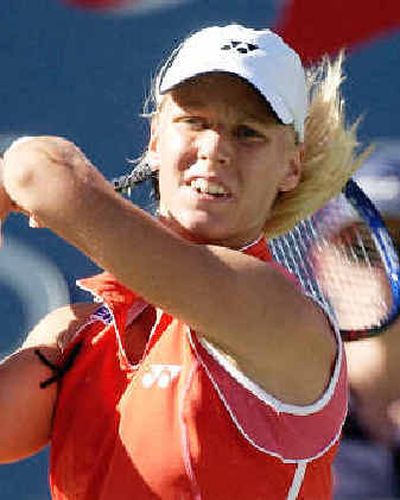Capriati, Davenport fade in U.S. Open semifinals

NEW YORK — Body slumped and eyes vacant, Jennifer Capriati walked off the U.S. Open tennis court Friday stuck in a horrifying rewind, once again within points of her first final only to depart in failure, betrayed by the inability to close out a third-set tiebreaker.
Though no less disappointing to herself or an American tennis public, Lindsay Davenport’s betrayal came in physical form, with a leg injury restricting her movement so severely she could barely get from sideline to sideline. Thus did she lose her three-set semifinal, a double American setback that set up this season’s second all-Russian Grand Slam final.
Capriati lost her chance to defeat Russian Elena Dementieva despite serving at 6-5 in the third set, in which she saved a crucial break point only to commit her only double fault of the match. She then dropped the tiebreaker, 7-5. Incredibly, the 28-year-old American couldn’t find a way to take advantage of a ridiculously slow Dementieva serve that rarely reached the 60 mph range, losing the first set 6-0, taking the second 6-2, and losing the third 7-6 (7-5).
“It’s kind of hard to really grasp what happened out there,” a sullen Capriati said.
Davenport lost her chance to defeat Russian Svetlana Kuznetsova when she aggravated what she called a “strain in the groin or hip flexor area” midway through the second set of a match she was controlling, having won the first set, 6-1, and leading in the second, 3-1. She lost the second set, 6-2, took a timeout to have the leg re-taped, but lost the third anyway, 6-4.
“I’m fine with losing.” Davenport said. “It’s not the losing part. I just wish that I had lost because I was terrible or I didn’t play well and she played great. She did play well. I just felt like I was working from a disadvantage. I’m just disappointed that I didn’t get the opportunity to either win or lose at 100 percent.”
Both American women had shown encouraging signs of career rejuvenation here at Flushing Meadows, Davenport riding into her semifinal on a 22-match, four-tournament winning streak, Capriati finally showing she’d recovered from last year’s devastating three-set semifinal loss to eventual U.S. Open champion Justine Henin-Hardenne. But the semifinals proved their last stand, when a cloudless but maddeningly windy day left them fighting themselves, the elements, and the continuing rise of Russian women’s tennis.
“Really, that’s got to be the hardest conditions to play in,” Capriati said. “You just have to make the adjustments because there’s obviously things you can’t control. You can’t control your opponent, you can’t control Mother Nature.”
Capriati’s exasperation had to be directed squarely at herself, flustered as she was by the badminton-like serves that even Dementieva admitted were drawing laughs from fans in the stands. But Dementieva did an excellent job of just getting the serves over in time to set up for her devastating groundstrokes, and Capriati, who also lost a third-set tiebreak to Monica Seles in 1991, was sent home again.
Thus are there no Americans remaining in either the men’s semifinals or thewomen’s final. This is the first time any Russian women has reached the U.S. Open final, with two guaranteeing a third Grand Slam title in 2004 to a nation still mourning recent terrorist attacks. Anastasia Myskina bested Dementieva to win the French Open, and Maria Sharapova beat Serena Williams to take Wimbledon.
As the Russian contingent grows, the Americans are faltering. Davenport talks openly about retirement, but nothing is set because of her success of late.